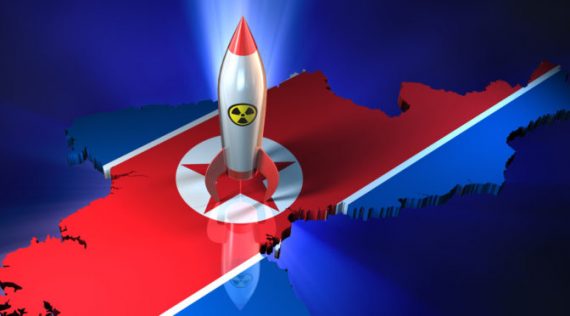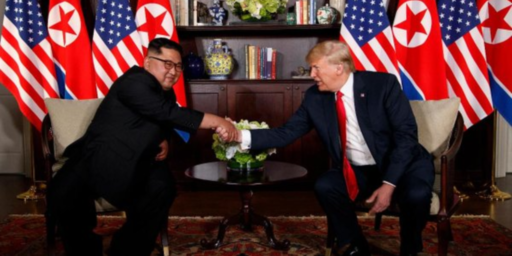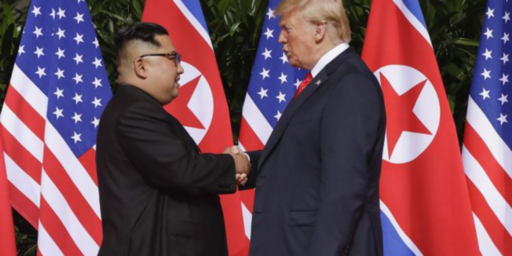Why Does The U.S. Continue To Pursue An Impossible Goal With North Korea?
Why does the U.S. continue to pursue the seemingly impossible goal of denuclearization with regard to North Korea? In part, it's because we're still locked into thirty-year-old rhetoric.
In response to a Wall Street Journal column regarding diplomacy toward North Korea by Walter Russell Mead in which Mead puts forward the assertion that the goal of American talks with North Korea should be denuclearization, Daniel Larison asks why American policy members insist on putting forward the seemingly impossible for now goal of getting the DPRK to give up its nuclear weapons:
Besides the embarrassment of failure, why is there such an aversion to accepting that denuclearization won’t happen? It is not because the U.S. has never had to cope with a hostile, nuclear-armed state before. The U.S. has been facing far larger threats from nuclear-armed, hostile dictatorships for decades, and it has managed those threats successfully all this time. I suspect that many people insist on denuclearization out of habit, others echo this line simply because it is the consensus view, and all of them prefer not to challenge that consensus for fear of being seen as “soft” on North Korea. My guess is that the fear of not appearing “tough” has a lot to do with this clinging to an impossible goal. For many policymakers and pundits, it is politically safer and easier to endorse a policy goal that can’t be achieved because it is considered “tough” even if it creates a more dangerous situation for the affected countries. Our foreign policy debates create and reinforce these perverse incentives, and our diplomacy needlessly suffers as a result.
Larison comes up with one good explanation here, but I think there’s more to than that, and much of it has to do with the history of how Presidents of both parties have approached North Korea for at least the past thirty years since the DPRK started pursuing a nuclear weapons program. On a bipartisan basis, Presidents and foreign policy experts in both parties have basically clung to the proposition that the leadership of North Korea in general, and the Kim family is, for lack of a better way of putting it, insane and suicidal. Under this theory, the main reason that North Korea is pursuing a nuclear weapons program, and the reason that they must be stopped, is because they intend to use it to strike against South Korea, Japan, or the United States. This argument has been applied most especially to the current leader of North Korea but it was also applied to his father and grandfather when they were in office as well, even when the available evidence seemed to clearly indicate otherwise.
Under this theory, we must stop North Korea from obtaining nuclear weapons because once they have them, they will inevitably use them, perhaps even in a first strike scenario. Such a strike, of course, would indeed be suicidal because it would inevitably be followed by retaliatory strikes that would essentially destroy North Korea as a nation and bring about the end of the Kim regime once and for all. As I noted yesterday, this assumption flies in the face of twenty years or more of evidence regarding what the leaders of North Korea might be thinking. Instead of pursuing nuclear weapons and ballistic missile technology so they can engage in a one-off nuclear strike that would put a countdown clock of hours on their own lives and the life of the nation they lead, it seems clear that the leaders of North Korea are motivated primarily by a concern for survival and that they are ultimately looking for some kind of guarantee of territorial integrity for the DPRK. In no small part, they likely are pursuing this strategy in no small part thanks to the policies the United States has pursued over the past eighteen years with regard to nations such as Libya, Iraq, and Iran. It has also likely been informed in part by the reaction of the world community to the acquisition of nuclear weapons by nations such as Israel, India, and Pakistan notwithstanding existing international treaties regarding the proliferation of nuclear weapons. The lesson, of course, is that nations with nuclear weapons or the capability of developing them are treated far differently than nations that have cooperated with demands that they give up their weapons of mass destruction programs. Based on those lessons, leader who fear the possibility of intervention that could threaten their rule would rationally conclude that pursuing nuclear weapons is the best way to ensure their survival. From that perspective, the actions the North Koreans are entirely rational and the idea that they would give all that up by acting in a way that would ensure their destruction is entirely inconsistent with the available evidence.
To answer Larison’s question, though, in addition to this suggested explanation, I think there’s more at play as well. For thirty years now, we’ve pursued the seemingly impossible goal of denuclearization based on what is essentially a faulty assumption. At this point, both sides of the aisle in the United States have so are so heavily in the idea that the North Korean regime is insane and suicidal that backing away from that idea would require them to admit that the entire premise of American policy toward North Korea has been wrong. In other words, we’re talking about a combination of intertia, stubbornness, and the fear of the political consequences of admitting that previous suppositions about the DPRK have been mistaken. This would seem to be especially true of the current Administration, which is headed by a man which spent a good part of his time as a candidate and his first year as President pushing the idea that the man he calls “Little Rocket Man” is out of his mind and that only Donald Trump can stop him. One does hope that, at least on some level, the President is being advised by people behind the scenes who recognize the reality of the motivations that actually seem to be driving the DPRK’s policies, but it’s unclear whether he’s actually listening to them.






North and South Korea marched under the same flag at the Olympics. Kim’s sister is the toast of the town. I’ll be surprised if SK polls don’t tip away from US belligerence and toward NK. We’re seeing the results of a psychopath on psychopath pissing match and their psychopath is smarter than ours.
You have to admit, Kim played this beautifully. He goaded the idiot into engaging in a loud and threatening exchange in which the leader of the free world lost a game of the dozens to a guy who doesn’t even speak English. Kim let Trump yak yak yak, kept right on testing bombs and missiles, revealing Trump for the empty suit he is, then pivoted easily to a charm offensive in South Korea. It was well done.
Now what do we do? Carry out this supposed ‘bloody nose’ attack when the whole world thinks we’re the crazy aggressors? Risk a war that might kill hundreds of thousands of South Koreans who’ve just been charmed by sister Kim? It would mean the end of American dominance in Asia.
As you say, Doug, we are trapped by our own rhetoric. Somehow we have to get from “We will never allow!” to, “Meh.” That’s a whole lot of Nixon to China to pull off for the gang that can’t think straight.
NK likely doesn’t have a first use policy. As you point out, it would be suicidal.They may, however, have a ‘use it or lose it’ policy in place if they are attacked. And aren’t we still talking about regime change? So if we attack, they may figure they’ve got nothing to lose and launch whatever the Asian equivalent of Gotterdammerung is.
This is, I think, largely the same thing we’re doing in Afghanistan. We decide, for political reasons, that we must “win”, even if we have no idea what “win” looks like. We must win, Kim must be defeated. I suspect Obama’s policy was maybe a bit more nuanced than the rhetoric, probably also W. With Trump I fear what we see is what we get.
Because you can’t fix stupid?
@michael reynolds:
Millions Michael, millions.
“…leadership of North Korea in general, and the Kim family is, for lack of a better way of putting it, insane and suicidal. Under this theory, the main reason that North Korea is pursuing a nuclear weapons program, and the reason that they must be stopped, is because they intend to use it to strike against South Korea, Japan, or the United States.”
The people who hold this position hold it, as you suggest, because they’re trapped by their own rhetoric and are too arrogant to admit they’re wrong. They also know that they are presenting a false dichotomy. I say this because of an experience that I had with a US Arny officer while I was living in Korea.
It seems that this guy was a “force Iran to the negotiating table” supporter of Iranian nuclear disarmament. When I asked him why, noting that MAD had worked with every other nation that has nukes, he gave the same argument as the one above using “Iran” for NK.
At that point, I suggested that it would be unlikely that we would actually be able to get Iran to agree to end their nuclear program–a point about which he admitted the possibility while asserting that the goal still had to remain what he advocated for his given reason–just too dangerous. My come back position was that if, in fact, nuclear Iran was simply too dangerous, the real answer to the problem was to destroy Iran, killing virtually every man, woman, and child in the country to eliminate the threat for once and for all. And that doing it now, while they can’t retaliate, was the best option.
I’m going to use quotes for his reply because his reply was etched indelibly on my mind. (I also sort of agree with his assessment of me.)
He, just like the people who are making the argument about NK, didn’t really believe what he was asserting and was too arrogant to admit his excess. The problem is that believing in magical formulae of sanctions, bloodied noses, pixie dust, and ‘Murkan might may be even more dangerous than I am. Additionally, we DO seem to have the same kind of “f**king psychopaths” doing NK policy at the White House.
No good can come from this. Where is the sane person? The adult that the GOP promised us would be in the room?
It’s Valentine’s Day and I’m going out to a great dinner in an excellent restaurant with my favorite company tonight so I’m inclined to give Trump a (small) break on this one. The fact is, we really don’t know how to deal with the world except by threatening other countries and getting frustrated when they don’t do what we want.
Why wouldn’t North Korea or Iran want nukes? They’re not idiots: non-nuke-armed countries get invaded, nuke-armed countries don’t. We’re the stupid nation on this front.
What Trump has done is press down on the accelerator with policies and tactics we have been using for decades. We’re just paying attention now because he thinks it’s real when what we’ve been pursuing is kind of “reality TV” foreign policy. The irony is soooo thick you could cut it with a knife!
@michael reynolds: I agree with everything you posted here except to imply that Kim’s sister is “the toast of the town” for the South Koreans. SK citizens know very well what a hellhole NK is and I’m pretty sure they aren’t taken in by her Mona Lisa smile. The only ones charmed are members of the international press. I think in a way the situation is much like east and west Germany was but with more overt aggressive actions. Neither side wants a conflict, there are still family ties on both sides and a detente between the two is desired, but SK is not being charmed.
It’s interesting that those who, whatever the threat, put forth the view that the threat author(s) is/are insane and/or suicidal ascribe to others a willingness to engage in actions which they themselves would never undertake. They must believe that all such opponents have a death wish – in contrast to their purely rational calculations.